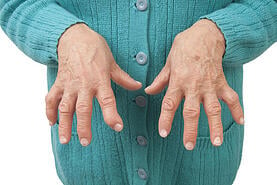Published on: June 28, 2013

If your hands and feet start to become swollen, and later your hips, knees, and shoulders follow suit, there's a possibility you have rheumatoid arthritis. Rheumatoid arthritis (RA) is when the body's immune system rebels, and starts to attack the various parts of the body, resulting in painfully swollen joints. The physical manifestation of RA are raised bumps or nodules under the skin, and sufferers of the condition may also experience fatigue and weight loss.
Unfortunately, advanced forms of the condition can cause your joints to become severely deformed and effectively render you physically handicapped.
Although there isn't one specific medical test that can diagnose RA, blood tests can often measure how likely it is that someone is suffering from it. One of the worst aspects of the condition is that there isn't a cure for it.
So, can sufferers of RA receive disability benefits? The short answer is yes. People with very mild forms of RA will probably still be able to perform necessary lifestyle activities or work functions, but those who are dealing with moderate to severe forms are certainly eligible to receive benefits.
Qualifying For RA Benefits
In order to qualify for benefits, your RA must: 1) meet the requirements of Social Securities medical listings or 2) be severe enough to keep you from working. Social Security will find you medically disabled if you meet at least one of the following requirements.
1. You're unable to perform many different types of tasks with both of your arms.
2. You experience significant difficulty walking because the condition is present in your leg joint(s).
3. You have major inflammation or permanent deformity in one or more major joints. You also exhibit at least 2 of these symptoms - fever, fatigue, malaise, or involuntary weight loss.
4. Your RA is severe enough to cause on-going flare-ups, along with fever, fatigue, malaise, or weight loss. These two elements combined severely affect your ability to perform your daily activities.
5. Your RA causes you to have ankylosing spondylitis (a form of autoimmune disease that causes inflammation, pain and stiffness of the spine) or another spondyloarthropathy, with fixation of your spine of at least 30 degrees.
Other Options, If You Don't Meet The Specific Medical Qualifications
Perhaps you don't technically meet any of the above requirements for receiving benefits for your RA - don't worry, there might still be hope for you. You simply need to prove to Social Security that you're unable to work as per normal. Social Security will evaluate you by assigning you a "Residual Functional Capacity" - the level of work functioning you're able to engage in - sedentary, light, medium, or heavy. Your doctor will have to provide information, including all of your limitations, and specific documentation concerning your limitations/restrictions and your ability to function in the work place.
After developing your RFC, Social Security will examine your case, and either classify you disabled with regard to your RA and your work, or not.
It should be pointed out that if you're older (over age 50), have less education, and don't have that many applicable skills , your RFC will actually be judged a bit more leniently.
Contact Us
Whether if you're in need of assistance in applying for disability or you've been denied benefits and would like to apply again, there's no doubt that an experienced professionals can assist you. They're here to help you get the compensation you deserve!

